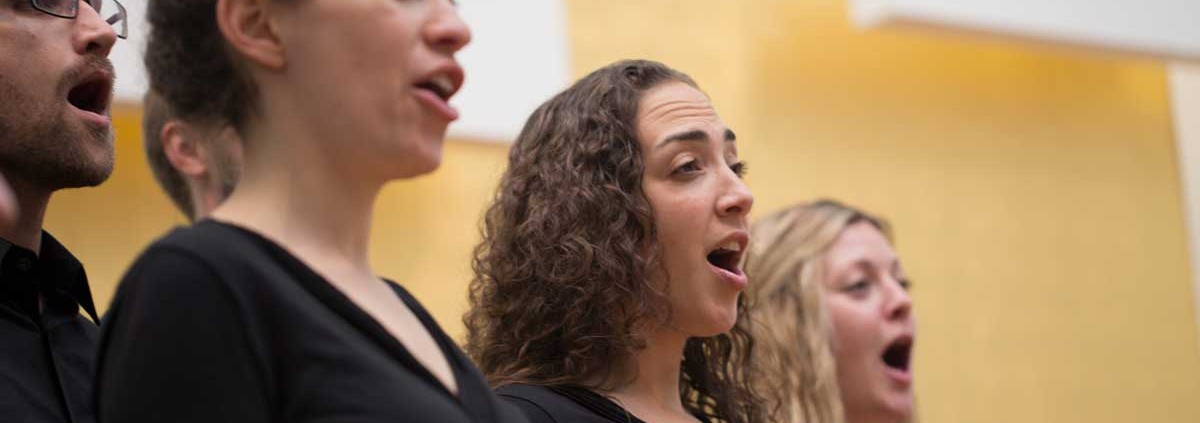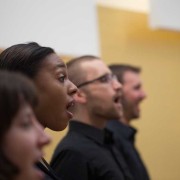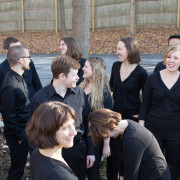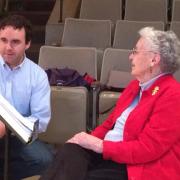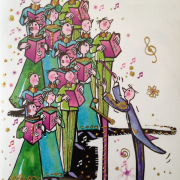Telling the Forest From the Trees
There are a handful of important life skills that I’ve come to value as I am decidedly in the adult phase of my life (my three small children are a constant reminder of this fact). Being able to manage expectations – others’ as well as our own – is up there. As is the ability to tap into our reserves of patience and poise when they seem to have run out. Another important skill is the ability to tell the forest from the trees and vice a versa. Myself, I am more of a tree person. I am detail oriented and hands-on. I am impulsive and short sighted. It takes a lot of work for my brain to zoom out and look at the big picture. Thankfully, the officers of Ensemble Companio consist of a lot of forest people. Our founder and director, Joseph Gregorio, has a fine-tuned sense of perspective.
The group was still in its germinating stages when he gathered what would become the officers of EC and asked that we compose our Mission Statement. Myself, I was staring at nothing but bark: how do we know what our mission is if we haven’t even rehearsed yet? Aren’t Mission Statements usually made of fluff and smoke anyway? From his bird’s eye view, Joe asked us to reflect on the purpose of singing, the reason for being in a choir, the possibilities of reaching people through music. Three hours later, the five of us stood proudly by a beautifully crafted sentence that breathed life into all that we believed in as musicians: Ensemble Companio’s mission is to build bridges between people through authentic, inspiring performances of the finest choral music. This was the first of countless instances where our skills as tree and forest thinkers came together to produce a cohesive vision, both grounded and far-reaching.
Whether one falls in the tree or forest category, this reference only works because at the beginning, there was a seed. The seed of Ensemble Companio sprouted in the head of Joe at a particular turning point in his career as a composer and conductor. It was a little voice describing a unique vision: a choir unlike any other, a choir that develops a meaningful and intimate relationship with the music it sings and seeks to subsequently foster a deep and personal rapport with its audience through that music. No matter the passion or intention (and Joe has a lot of both), a seed remains a seed unless it has adequate water and sunlight (if I may dig into this botanical metaphor a little deeper). The water came in the form of Joe’s college friends. We had all stayed in close contact over the years and were more than happy to respond to Joe’s call to song when he sent out a feeler over e-mail in the spring of 2011. And the sunshine came from the genuine joy we all felt singing together again. They say that a choir that gets along blends better. Ensemble Companio’s sound illustrates the old friendships that brought it together as well as the new relationships it has inspired. There is a lot of love in this sound.
So in the beginning, there was a seed and friendship and song. We were building something gratifying, powerful, and real. That first season rode on the back of optimism, faith and a certain degree of carefreeness – there was nothing to lose and so much to gain. We were awarded the 2012 American Prize in choral performance, which came as a total surprise to the singers since Joe did not tell us that he had submitted our live recordings to the competition. It was a reaffirmation that we were going in the right direction with more successes in the horizon. And it is when one is suddenly in possession of something precious and that the pressure kicks in: Keep up the good work; don’t mess it up.
As such, the second season had a little more stress and a little less improvisation. The new members rose to the challenge of the music and the mission. Their energy and commitment was an awesome vote of confidence that we would not be a one-season wonder. At this point, Joe had decided to commit us to performing off book. He feels strongly that in order to truly connect with our audience members, there have to be as few physical obstacles as possible. And folders can be just that: a barrier between the singers and their listeners. We knew how much work memorizing a one-hour set had been in the first season. There are no shortcuts: it is a labor that requires time and discipline – as well as trust that it can be done. There were a number of powerful moments during the course of the second season that reminded us why we were doing what we were doing. We spent three inspiring hours with Matthew Oltman – former director of Chanticleer – during which he honed in on our intentions behind our sound and asked that we sing with clarity of purpose. Our rendition of Randall Thompson’s Alleluiah was transformed after working with him on it.
Our second concert season, “America Singing,” was a huge success. Our audience remained dedicated but small. The officers decided that one of the priorities was to get the choir signed on to concert series so as to tap into systems that were already in place. In the fall of 2013, we presented a 30mn performance at the ACDA (American Choral Directors Association) Conference in Millersville, PA. This was an incredibly rewarding show since we were singing for people who are embedded in the choral scene. We all noticed the member of the audience who squealed with joy at the mention of William Billings (a composer of shape-note music) and listened with a blissful look on her face to our bright, nasal, purposefully unblended rendition of “Now Shall My Inward Joy Arise.” Equally as fulfilling were the two short shows we performed in the winter at a senior-assisted living center in Stamford, CT. Singing for individuals who do not often hear live music is one of our more important objectives. The experience was inspiring for everyone involved.
Our third season spring concerts managed to all be on concert series, which helped us sing for and connect to more people. Also, freeing ourselves from the logistics of putting together a concert allowed us to focus on bringing the repertoire up to its highest potential. The biggest musical challenge was an 8-part Bach motet lasting 12 minutes. After many growing pains, we eventually managed to perform it off-book, proving to ourselves that no piece is too difficult for us master with our lofty standards. As the choir put yet another successful season to bed, I stepped down as president. The officers will benefit from the fresh pair of eyes and strong voice of Cailin Wilke as they continue to chart the group’s course. We are in great shape: our trees are very strong and our forest is healthy. The future sounds bright for Ensemble Companio.

